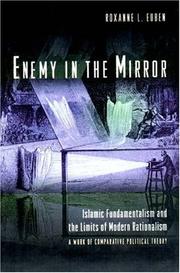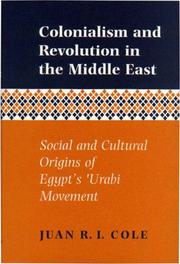| Listing 1 - 2 of 2 |
Sort by
|

ISBN: 0691058431 069105844X 1282753819 9786612753817 1400823234 140081152X 9781400823239 9780691058443 9780691058436 Year: 1999 Publisher: Princeton (N.J.): Princeton university press
Abstract | Keywords | Export | Availability | Bookmark
 Loading...
Loading...Choose an application
- Reference Manager
- EndNote
- RefWorks (Direct export to RefWorks)
A firm grasp of Islamic fundamentalism has often eluded Western political observers, many of whom view it in relation to social and economic upheaval or explain it away as an irrational reaction to modernity. Here Roxanne Euben makes new sense of this belief system by revealing it as a critique of and rebuttal to rationalist discourse and post-Enlightenment political theories. Euben draws on political, postmodernist, and critical theory, as well as Middle Eastern studies, Islamic thought, comparative politics, and anthropology, to situate Islamic fundamentalist thought within a transcultural theoretical context. In so doing, she illuminates an unexplored dimension of the Islamist movement and holds a mirror up to anxieties within contemporary Western political thought about the nature and limits of modern rationalism--anxieties common to Christian fundamentalists, postmodernists, conservatives, and communitarians. A comparison between Islamic fundamentalism and various Western critiques of rationalism yields formerly uncharted connections between Western and Islamic political thought, allowing the author to reclaim an understanding of political theory as inherently comparative. Her arguments bear on broad questions about the methods Westerners employ to understand movements and ideas that presuppose nonrational, transcendent truths. Euben finds that first, political theory can play a crucial role in understanding concrete political phenomena often considered beyond its jurisdiction; second, the study of such phenomena tests the scope of Western rationalist categories; and finally, that Western political theory can be enriched by exploring non-Western perspectives on fundamental debates about coexistence.
Islamic fundamentalism --- Rationalism --- Islamic countries --- Politics and government --- Islamic fundamentalism. --- Rationalism. --- #SBIB:031.IO --- #SBIB:321H91 --- #SBIB:316.331H330 --- Knowledge, Theory of --- Religion --- Belief and doubt --- Deism --- Free thought --- Realism --- Fundamentalism, Islamic --- Islamism --- Islam --- Religious fundamentalism --- Niet-specifieke politieke en sociale theorieën vanaf de 19e eeuw: islam, Arabisch nationalisme --- Godsdienst en politiek: algemeen --- -Muslim countries --- Politics and government. --- Islamic countries - Politics and government --- Alterity. --- Ambiguity. --- Anachronism. --- Anathema. --- Anthropomorphism. --- Anti-Oedipus. --- Anti-Western sentiment. --- Anti-imperialism. --- Antinomy. --- Apologetics. --- Assassination. --- Authoritarianism. --- Clash of Civilizations. --- Communitarianism. --- Criticism. --- Critique of ideology. --- Critique. --- Deductive reasoning. --- Deism. --- Demagogue. --- Despotism. --- Dialectical materialism. --- Dichotomy. --- Dictatorship. --- Disadvantage. --- Disenchantment. --- Emotivism. --- End of history. --- Ethnocentrism. --- Excommunication. --- False consciousness. --- False god. --- God. --- Great Satan. --- Hannah Arendt. --- Heresy. --- Heterodoxy. --- Hostility. --- Hypocrisy. --- Ideology. --- Idolatry. --- Impediment (canon law). --- Imperialism. --- Infidel. --- Injunction. --- Inner-worldly asceticism. --- Irrationality. --- Irreligion. --- Islam. --- Islamic extremism. --- Islamism. --- Islamization of knowledge. --- Jamal ad-Din al-Afghani. --- Jihadism. --- Legitimation crisis. --- Manichaeism. --- Materialism. --- Militarism. --- Modernity. --- Nihilism. --- Obscurantism. --- Oppression. --- Orientalism. --- Overreaction. --- Paradox. --- Political Order in Changing Societies. --- Political alienation. --- Political aspects of Islam. --- Political decay. --- Political philosophy. --- Political prisoner. --- Politics. --- Postmodern philosophy. --- Postmodernism. --- Prejudice. --- Protest vote. --- Qutb. --- Radicalism (historical). --- Radicalization. --- Rashid Rida. --- Reactionary. --- Rebuttal. --- Reformism. --- Religion. --- Seditious conspiracy. --- Separate spheres. --- Separation of church and state. --- Sharia. --- Skepticism. --- Social criticism. --- Sovereignty. --- Spiritual crisis. --- Superstition. --- The End of Ideology. --- Truism. --- Vagueness. --- Vulnerability. --- Wahhabism. --- Yellow Peril.

ISBN: 1282457764 9786612457760 1400820901 1400811279 9781400811274 9781400820900 9780691056838 0691056838 140080132X Year: 1993 Publisher: Princeton, N.J. Princeton University Press
Abstract | Keywords | Export | Availability | Bookmark
 Loading...
Loading...Choose an application
- Reference Manager
- EndNote
- RefWorks (Direct export to RefWorks)
In this book Juan R. I. Cole challenges traditional elite-centered conceptions of the conflict that led to the British occupation of Egypt in September 1882. For a year before the British intervened, Egypt's viceregal government and the country's influential European community had been locked in a struggle with the nationalist supporters of General Ahmad al-`Urabi. Although most Western observers still see the `Urabi movement as a "revolt" of junior military officers with only limited support among the Egyptian people, Cole maintains that it was a broadly based social revolution hardly underway when it was cut off by the British. While arguing this fresh point of view, he also proposes a theory of revolutions against informal or neocolonial empires, drawing parallels between Egypt in 1882, the Boxer Rebellion in China, and the Islamic Revolution in modern Iran. In a thorough examination of the changing Egyptian political culture from 1858 through the `Urabi episode, Cole shows how various social strata--urban guilds, the intelligentsia, and village notables--became "revolutionary." Addressing issues raised by such scholars as Barrington Moore and Theda Skocpol, his book combines four complementary approaches: social structure and its socioeconomic context, organization, ideology, and the ways in which unexpected conjunctures of events help drive a revolution.
Social classes --- Class distinction --- Classes, Social --- Rank --- Caste --- Estates (Social orders) --- Social status --- Class consciousness --- Classism --- Social stratification --- History --- ʻUrābī, Aḥmad, --- Egypt --- Aḥmad ʻArābī, --- Aḥmad ʻIrābī, --- Aḥmad ʻUrābī, --- ʻArābī, Aḥmad, --- ʻArabi Pasha, --- ʻIrābī, Aḥmad, --- Ourabi, Ahmad, --- Ourabi, Ahmed, --- ʻUrābī Pasha, --- أحمد عرابي --- عرابي، أحمد، --- عرابي، احمد --- عرابي، احمد، --- عرابى، أحمد، --- History of Africa --- anno 1800-1899 --- Abbasid Caliphate. --- Activism. --- Al-Ahram. --- Al-Mahdi. --- Algerian War. --- Ancien Régime. --- Anti-imperialism. --- Arabization. --- Banditry. --- Before the Revolution. --- Bourgeoisie. --- British Empire. --- Bureaucrat. --- Byzantine Empire. --- Caliphate. --- Capitalism. --- Censorship. --- Central Asia. --- Circassians. --- Colonialism. --- Conspiracy theory. --- Constitutionalist (UK). --- Corporatism. --- Counter-revolutionary. --- Decolonization. --- Despotism. --- Economic interventionism. --- Education in Egypt. --- Egyptian Government. --- Egyptian crisis (2011–14). --- Egyptian law. --- Egyptians. --- Elie Kedourie. --- Emir. --- English Revolution. --- Expansionism. --- Expatriate. --- Extraterritoriality. --- Foreign policy of the United States. --- From Time Immemorial. --- Ideology. --- Imperial Ambitions. --- Imperialism. --- Indian Rebellion of 1857. --- Infant industry. --- Insurgency. --- Intelligentsia. --- International relations. --- Iranian Revolution. --- Jamal ad-Din al-Afghani. --- Jingoism. --- Khedive. --- Labor aristocracy. --- Liberalism (book). --- Liberalism. --- Loan shark. --- Mercantilism. --- Middle East. --- Mirrors for princes. --- Nativism (politics). --- Neocolonialism. --- New Political Economy (journal). --- Newspaper. --- On Revolution. --- Orientalism. --- Ottoman Empire. --- Pan-Islamism. --- Peasant. --- Pogrom. --- Political revolution. --- Politics. --- Poll tax. --- Populism. --- Radicalism (historical). --- Reformism. --- Revolution. --- Revolutionary movement. --- Ruhollah Khomeini. --- Salman Rushdie. --- Sayyid. --- Secularization. --- Social revolution. --- State within a state. --- States and Social Revolutions. --- Subaltern (postcolonialism). --- Suez Canal Company. --- Suez Crisis. --- Tanzimat. --- Tax collector. --- Tax. --- The Imperialism of Free Trade. --- Tyrant. --- Upper Egypt. --- Urban riots. --- Use tax. --- Usury. --- Warfare. --- Westernization. --- Young Turk Revolution. --- Zoroaster. --- Urabi, Ahmad,
| Listing 1 - 2 of 2 |
Sort by
|

 Search
Search Feedback
Feedback About UniCat
About UniCat  Help
Help News
News